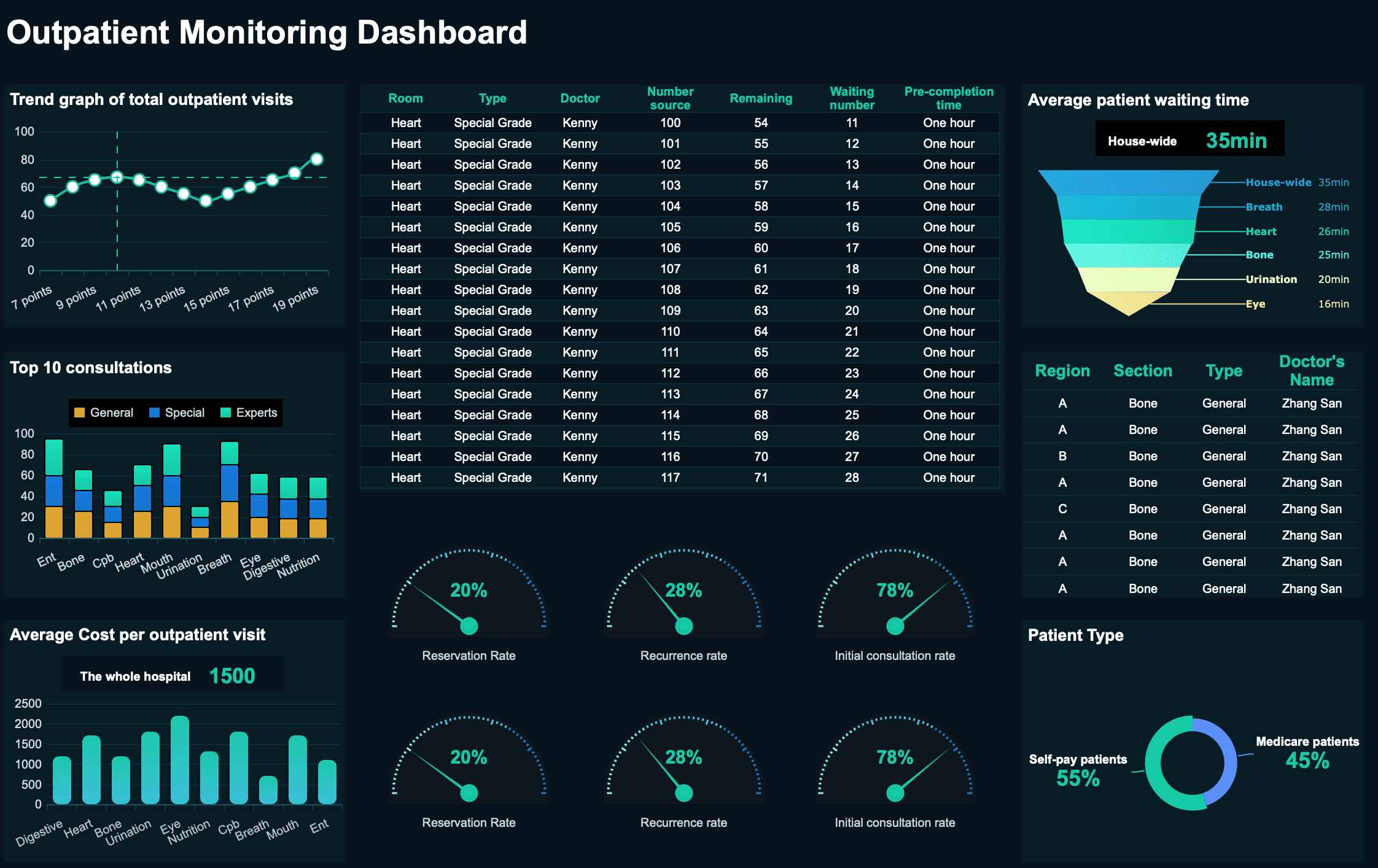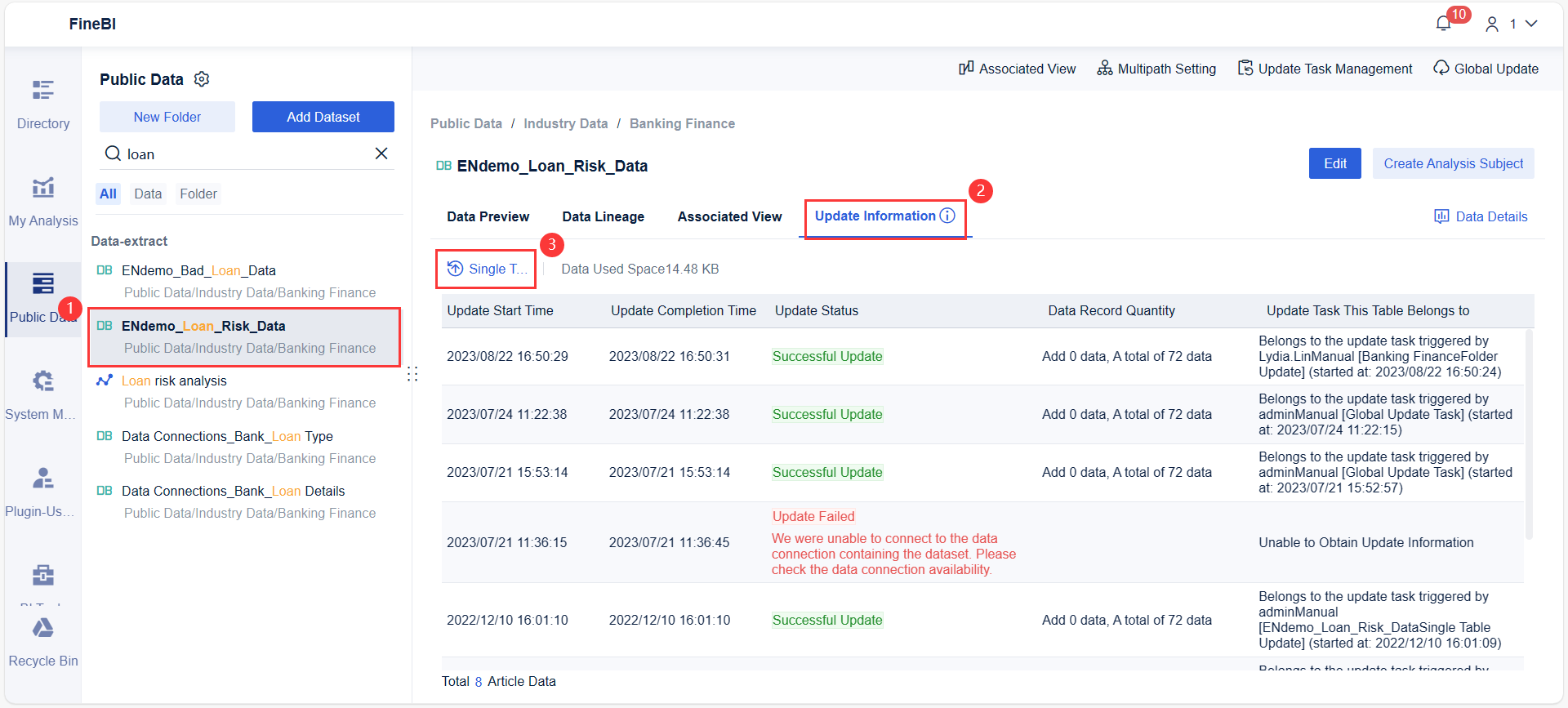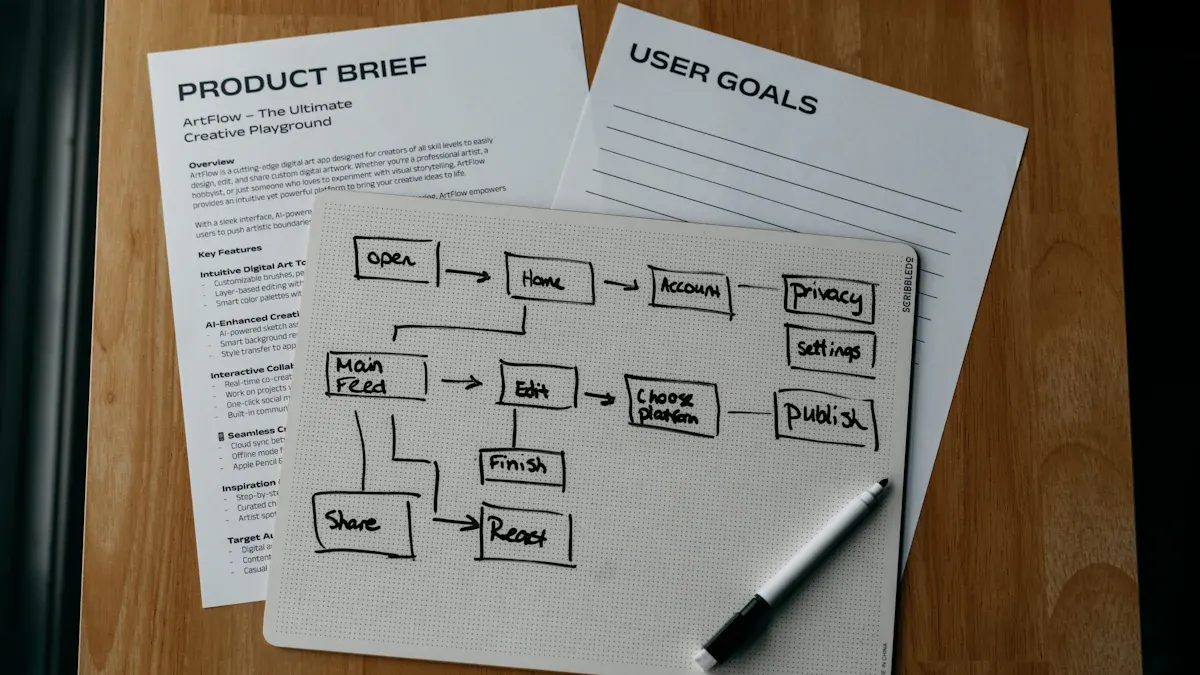Healthcare management involves guiding and leading efforts to support health at every level—individual, organizational, and systemic. You use health management to address behavioral, social, and environmental factors that shape health and care delivery. Effective healthcare management improves how healthcare organizations operate and enhances patient care. As technology evolves, you benefit from advanced data tools like FineBI, which help you analyze complex healthcare data and make informed decisions for better health outcomes.

You use healthcare management to guide how organizations deliver health services and improve health outcomes. Healthcare management involves setting goals, creating strategies, and making decisions that shape the direction of healthcare organizations. You focus on effectiveness, efficiency, and equity to ensure that health services reach the people who need them most. Healthcare management covers the entire organization, not just individual departments. You oversee planning, organizing, staffing, controlling, directing, risk assessment, and decision-making. These functions help you maintain high standards in health management and support public health initiatives.
Healthcare management differs from healthcare administration. You direct the overall strategy and policies for the organization. Healthcare administration focuses on daily operations and logistics within specific departments. You make decisions that affect the entire healthcare facility, while administrators manage staffing and budgets for their areas.
Healthcare management centers on three principles: effectiveness, efficiency, and equity. You apply these principles to improve health outcomes and organizational performance.
Healthcare management includes several key elements that help you achieve organizational goals and improve health outcomes. You need strong management competencies, effective care management strategies, and tailored training programs for your team. You identify populations with modifiable risks and align health management services to meet their needs. You prepare and integrate the right personnel to deliver quality health services.
Below is a table summarizing the primary functions and responsibilities in healthcare management:
| Function/Responsibility | Description |
|---|---|
| Planning | You set goals and establish strategies for healthcare delivery. |
| Organizing | You coordinate departments and resources for efficient operations. |
| Staffing | You recruit, hire, and schedule employees to meet health management needs. |
| Controlling | You monitor performance and ensure compliance with health regulations. |
| Directing | You lead teams and make strategic decisions for better health outcomes. |
| Risk Assessment | You identify and manage potential risks in healthcare facilities. |
| Decision-Making | You make informed choices that impact growth and patient care. |
You also focus on human resources strategies. Training and development have the strongest positive relationship with organizational performance. Compensation and reward systems play a significant role in motivating staff. Recruitment strategies help you build a skilled workforce. Managerial competencies and information sharing enhance the effectiveness of health management practices.
Here are the key elements that drive effective healthcare management:
You use healthcare management to develop and implement goals for efficiency and quality of care. You ensure regulatory compliance, prepare and monitor budgets, recruit and schedule employees, and serve as a spokesperson for your facility. These responsibilities help you create a safe, effective, and equitable environment for health management.
Healthcare management supports public health by improving how organizations deliver health services. You use data and evidence to guide decisions, measure performance, and adapt strategies. When you apply these key elements, you strengthen health management and achieve better health outcomes for individuals and communities.

You use planning as the foundation of health management. Effective planning in healthcare management helps you set clear goals and develop strategies that guide your organization. Strategic planning lets you respond to changes in the healthcare environment and improve health outcomes. You can use predictive analytics to anticipate patient needs and optimize resources. Cost-benefit analysis helps you decide where to invest for the greatest impact on health. Priority-setting frameworks ensure you focus on urgent needs and expected results. Equity-focused frameworks help you distribute resources fairly, supporting public health and reducing disparities.
| Principle | Description |
|---|---|
| Strategic planning | Develop long-term goals and policies to guide the direction of healthcare organizations. |
| Financial stewardship | Manage budgets, control costs, and ensure financial sustainability within healthcare facilities. |
| Regulatory compliance | Ensure adherence to laws, regulations, and accreditation standards to maintain quality and avoid legal issues. |
| Quality improvement | Implement processes to enhance patient care, safety, and satisfaction. |
| Human resource management | Recruit, train, and retain qualified healthcare professionals to deliver effective services. |
| Information management | Utilize health information systems to collect, analyze, and protect patient data for informed decision-making. |
Strategic planning in healthcare management improves patient outcomes and helps control costs. You identify service gaps and use value-based care frameworks to enhance satisfaction and financial performance.
You structure your health management team to support effective healthcare delivery. Most organizations use hierarchical, matrix, or flat structures. Hierarchical structures provide clear authority, while matrix structures encourage collaboration. Flat structures give employees more autonomy. You choose the structure that fits your organization's size and goals.
Effective leaders in healthcare management foster trust, encourage learning, and empower staff. When you create a positive environment, employees feel engaged and motivated. This leads to better health outcomes and higher patient satisfaction.
You use workforce management tools to predict patient volumes and adjust staffing. This ensures patients receive timely care and improves overall health management practices.
Quality and compliance are essential in health management. You must follow standards such as HIPAA, HITECH, EMTALA, ACA, and CMS. These regulations protect patient information, ensure access to emergency services, and set requirements for reimbursement.
| Standard | Description |
|---|---|
| HIPAA | Mandates industry-wide standards for the protection and confidential handling of patient health information. |
| HITECH | Promotes standardized electronic health records and strengthens HIPAA enforcement. |
| EMTALA | Ensures public access to emergency services regardless of insurance coverage. |
| ACA | Requires healthcare providers to implement compliance and ethics programs for reimbursement. |
| CMS | Enforces compliance statutes and reimbursement steps for Medicare, Medicaid, and CHIP. |
Accreditation programs improve the quality of healthcare services. When you meet these standards, you enhance patient safety and gain access to funding. Accreditation also supports continuous improvement in health management.
By focusing on quality and compliance, you build trust with patients and regulators. You ensure your organization delivers safe, effective, and equitable health services.

You play a vital role in health management by guiding teams and shaping the direction of healthcare organizations. Your responsibilities in healthcare management extend beyond daily operations. You set standards for health services and create clear benchmarks for your team. You advocate for the value of health management and develop educational programs that prepare staff for leadership. You ensure certification systems validate the skills of your team and promote continuous learning through regular training and recertification. You support professional networks that encourage knowledge sharing and influence policies that recognize management competencies. You outline transparent career pathways and track progress to ensure ongoing competency development.
Here is a summary of core responsibilities you take on in healthcare management:
You also ensure that health services operate efficiently and comply with regulations. You oversee daily operations, manage budgets, and maintain high-quality patient care. Your leadership in health management directly impacts health outcomes and supports public health goals.
You can find a wide range of positions in healthcare management, each with unique qualifications and responsibilities. Your role may vary depending on the type of healthcare organization, such as hospitals, clinics, nursing homes, or insurance companies. In some settings, you focus on specific operational areas, while in others, you oversee the entire organization.
Common positions in health management include:
You may also encounter roles that focus on supporting daily health operations and information management. The table below outlines typical positions and the qualifications required for each:
| Role Title | Qualifications Required |
|---|---|
| Administrative Assistant | High school diploma; experience in office tasks |
| Medical Office Assistant | High school diploma; training in medical office |
| Health Unit Coordinator | High school diploma; training in healthcare |
| Medical Coding Specialist | Certificate in medical coding |
| Medical Billing and Coding Specialist | Certificate in billing and coding |
| Health Information Technician | Associate's degree in health information |
| Hospital Administrator/CEO | Master's degree in healthcare administration |
| Chief Operating Officer (COO) | Master's degree in healthcare administration |
| Health System Executive | Master's degree in healthcare administration |
You see that health management offers many career paths, from entry-level positions to executive leadership. Each role contributes to the delivery of quality health services and the achievement of better health outcomes for individuals and communities.

When you apply healthcare management, you directly influence patient outcomes. You create a culture of continuous learning by supporting ongoing training and professional development. This keeps your team updated with the latest medical knowledge, which improves the quality of health services. You also build a supportive work environment, which leads to higher employee satisfaction and better continuity of care. By implementing quality improvement measures and patient safety protocols, you reduce medical errors and adverse events. You use electronic health records to coordinate care and lower the risk of mistakes. Telemedicine expands access to health services, making it easier for patients to receive timely care. You measure your impact using metrics such as mortality, readmissions, safety of care, effectiveness of care, patient experience, timeliness, and efficient use of imaging.
| Metric | Description |
|---|---|
| Mortality | Measures the rate of death among patients receiving care. |
| Readmissions | Tracks the percentage of patients readmitted within 30 days of discharge for the same condition. |
| Safety of care | Assesses the incidence of avoidable harm or complications during care. |
| Effectiveness of care | Evaluates compliance with best practice guidelines and the outcomes achieved. |
| Patient experience | Captures patients' perceptions and satisfaction with their care through surveys. |
| Timeliness of care | Measures the speed of care delivery, such as waiting times for treatment. |
| Efficient use of imaging | Assesses how effectively medical imaging resources are utilized in patient care. |
Healthcare management shapes how you deliver health services. You focus on quality management to ensure optimal health outcomes and patient satisfaction. You build trust in your healthcare system by maintaining high standards and following best practices. Effective health management helps you save costs and improve your organization’s reputation. You also support public health by ensuring compliance with legal standards and fostering research and innovation. When you establish a culture of improvement, you enhance patient care and safety. You use structured approaches to measure results and implement changes. By reducing waste and improving processes, you achieve operational excellence and better health for your community.
You can take healthcare management to the next level by using data-driven tools like FineBI. FineBI helps you integrate, analyze, and visualize health data from many sources. You use these insights to support clinical decisions, identify at-risk populations, and allocate resources for preventive health. FineBI streamlines administrative tasks, reduces costs, and empowers patients by connecting their health data with electronic health records. When you use dashboards and visual tools, you make complex health information easy to understand. This leads to better patient engagement and improved health outcomes. Studies show that visualization tools like FineBI enhance clinician performance and help you monitor and improve care processes across your organization.

You play a vital role in both health management and public health. These fields often intersect, especially when you address health at the community or population level. Public health focuses on preventing disease, promoting wellness, and protecting communities. You use health management skills to design and implement programs that improve health outcomes for large groups. Public health management requires you to understand how policies, such as Medicare and Medicaid, influence the financial health of hospitals. You must align your strategies with government regulations and public health goals.
You often see public health and health management overlap in areas like vaccination programs, health education, and emergency response. When you manage these programs, you use data to measure impact and adjust strategies. This approach ensures you meet the needs of your community and support better health for everyone.
Here is a table comparing the focus of health management and public health:
| Aspect | Master of Health Administration (MHA) | Master of Public Health (MPH) |
|---|---|---|
| Program goals and strengths | Management and leadership in healthcare organizations | Public health issues and population health |
| Focus | Managing healthcare services and organizations | Addressing health at the population level |
| Skills emphasis | Operations, administration, strategy | Epidemiology, social determinants, health promotion |
| Career preparation | Leadership in healthcare organizations | Public health analysis, program implementation |
You support health management by handling the daily operations of healthcare organizations. Healthcare administration focuses on managing clinical staff, overseeing patient care, and ensuring smooth workflows. You implement policies that affect how care is delivered. In contrast, healthcare management involves strategic planning and guiding the overall direction of the organization.
You can pursue various career paths in health management and administration. You might work as a health services manager, medical director, or healthcare consultant. Other roles include director of nursing, health information manager, or assisted living residence administrator. Most positions require a bachelor's or master's degree in health management or a related field. You help improve operational efficiency and patient outcomes in every role.

You play a crucial role in healthcare management by guiding organizations to deliver quality health services. Skilled managers help you improve health outcomes and patient satisfaction. Modern tools like FineBI support your decisions with clear data insights. The table below highlights why health management matters for you and your organization:
| Key Takeaway | Description |
|---|---|
| Importance of Management | You oversee operations and ensure quality care in healthcare organizations. |
| Impact on Patient Satisfaction | Effective management leads to better staffing, resources, and services. |
| Future Demand | The field is growing, offering strong opportunities for skilled managers. |
You shape the future of health by using strong management and technology to advance care.

The Author
Lewis
Senior Data Analyst at FanRuan
Related Articles

What is a data management platform in 2025
A data management platform in 2025 centralizes, organizes, and activates business data, enabling smarter decisions and real-time insights across industries.
Howard
Dec 22, 2025

Top 10 Database Management Tools for 2025
See the top 10 database management tools for 2025, comparing features, security, and scalability to help you choose the right solution for your business.
Howard
Dec 17, 2025

Best Data Lake Vendors For Enterprise Needs
Compare top data lake vendors for enterprise needs. See which platforms offer the best scalability, integration, and security for your business.
Howard
Dec 07, 2025